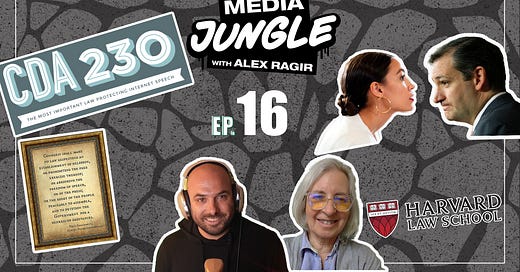Subscribe to Apple Podcasts, Spotify, Google Podcasts, Stitcher, and everywhere you listen to podcasts (if you like the show, leave us a review!). Not much time? Watch short clips on TikTok, Instagram, and Youtube.
Greetings from the Media Jungle! Welcome to new subscribers from United Nations, Medill School of Journalism, CNN and more.
Quick survey: do you find the transcripts of episodes below helpful? What types of interviewees do you like most? Simply respond to the email… thanks for your support!
This week he have:
Martha Minow: A professor and former Dean of Harvard Law School, and author of “Saving the News: Why the Constitution Calls for Government Action to Preserve Freedom of Speech” among others. She is currently the co-chair of the Access to Justice Project of the American Academy of Arts and Sciences, and co-chair of the advisory board to Massachusetts Institute of Technology’s Schwartzman College of Computing. Check out more about Martha here.
Podcasts grow from referrals, so if you like Media Jungle, please consider sharing with someone interested in learning about how the media industry works.
Read the transcript of the full interview below, or watch the full episode on our Youtube channel here:
Missed last week’s show? Here are two short clips from my chat with Jeffrey Dvorkin:
Here’s a transcript of this week’s episode:
Alex: Welcome to the Media Jungle video podcast. I'm your host, Alex Ragir, coming to you every week to break down the business behind the news industry, the future of media, and the creator economy. Subscribe to our Substack newsletter and YouTube channel, and don't forget to leave a review on Apple Podcasts. If you like the show, we appreciate your support. On this episode, I'm joined with Martha Minow, a professor and former Dean of Harvard Law School and author of “Saving the News: Why the Constitution Calls for Government Action to Preserve Freedom of Speech.” Martha, thanks for joining.
Martha: It's such a pleasure. Thank you.
Should governments save independent media?
Alex: Should governments save independent media? The constitution only mentioned one private institution: the press. They wanted it independent from government as a check on power, but the threat to independent journalism right now is not the government, it’s technology. The forefathers probably didn’t think Craigslist and LinkedIn and Google and Facebook would disrupt the business model of advertising. But since the forefathers saw it as such a critical part of democracy, should the government not be part of the solution? Stay tuned.
Alex: Martha, what do you think the forefathers would have said?
Martha: Understanding what the forefathers would have thought in our current world is a science fantasy game, but I can't say this: The Founding Fathers of this nation believe that the press was critical to democracy and to daily life; And that's why it's the only private institution that's mentioned and given its own private [protection] in the constitution. It's also the case that within the first five years of the constitution, the post office, which is also created by the constitution, created subsidies for the news media of that time. So it would not have surprised the Founding Fathers who were around at that time to see the government giving subsidies and other kinds of support to the media.
Alex: And it's a little bit interesting because they did designate it as a private entity for sort of a reason. I guess for independence. How does that play into the logic of how the government should play a role?
Martha: Well, quite right, and of course the government was smaller in all kinds of ways at that time. Over 200 years ago then it is now. But the idea that independent viewpoints would be expressed and propelled by a private press was very much the concept of the media that the constitution embraces. [It's] supposed to be a critical vehicle to criticize anyone in power, certainly those in government, but also those in private power. [To] have diversity of viewpoint was another major point, which is enabled by having a private industry that has many different providers.
Alex: So now you think that the government should take action to preserve and mostly local news, right? Or it's also national?
Martha: The local news is the leading edge of the crisis in news in America. But, in many parts of the country, there are problems even getting access to multiple viewpoints about national news or international news. To say that the government should take a role, let's be clear: I don't want the government making choices about content or viewpoint, but the government actually plays critical roles in setting up the rules of contract law, property law, antitrust law, consumer protection law, to provide the rules for common carriers that lie behind the media, to fund the inventions of the internet. The government is behind all of that.
Alex: As a law professor, nowadays you have influencers, podcasters, comedians giving you the news. You have outlets that call themselves news, but it's all opinion. How do you define journalists now, and how do you define news?
Martha: That of course is a big problem, and it's a problem, even with one of the solutions that I like, [the] Local News Sustainability Act pending in Congress right now. You know, the early media in this country, and it's true in other countries too, blended [what classifies as news]. You think about Ben Franklin and what he produced in his printing business. It was a mix of entertainment and advice and gossip and fiction and fact, so that's not particularly surprising. I think that when we do talk about government subsidies, [those] choices do come into play and there can be, I think, pretty dangerous and certainly not desirable manipulation. If there were a subsidy available to local news and it could be obtained by multinational companies or foreigners or people, as you say, who are not in the news business at all, [but] in the fake news business. So there are some tricky questions there for sure.
Alex: Do you think someone could go about sort of defining what an “objective journalist” or what a “journalist” is so that they could get some type of subsidies?
Martha: I think if we start with the local news phenomenon, I think we could emphasize the “local” and requiring proof that the outlet is actually located locally. That would screen out an awful lot of the abuses.
Alex: And is it independence? Because you have, I think it's 90% of U.S. news is controlled by like six companies. AT&T, Disney, Comcast, NewsCorp, CBS, and Viacom. It seems like it would be hard to make the case that we should bail or give them any type of money.
Martha: Well, I couldn't agree more. Although right now we do give them a subsidy through Section 230. We can talk about that in a little while they are exempted from the liabilities that attach to ordinary journalists. And so the government is subsidizing them and that shouldn't happen anymore. But you know, this is in some ways a devastating time with the loss of local reporting and even the ideal of news or objectivity, but in other ways, it's a golden age because you can have a local blogger or you can have somebody write about the what's happening on their block that nobody ever covered before in the conventional media. So one of the questions is how do we make sure that those voices are not drowned out by the amplification of some of those big companies that you've mentioned.
Alex: Are those types of changes, like trying to figure out what news is and [what opinion is]? Are those things that you're thinking about how to create new policies?
Martha: Well, again, I'm cautious and certainly concerned about the government getting into any content restrictions or even requirements of identifying a distinction between fact and news. The government shouldn't be in that business, but the government can do something that helps other people be in that business. The government can require a far more disclosure and transparency. The government can require the social media companies to make available and also accountable their own practices for how they harvest and how they amplify news. And when it would comes to cable [or] to Fox or MSNBC for that matter, the government can similarly require more transparency and also make available their data and our metadata for private researchers. I think that we should have rankings that are developed by private entities. It could be by researchers in the academic world or nonprofit organizations, could be by local faith-based communities. Let's have a war about that; not a war about the truth, but a war about the ratings of what's reliable and what's not.
Alex: Of the credibility of the actual publication, is that what you're referring to?
Martha: That's what I'm saying. And you know, we're much better about this with entertainment. [We] have different groups that rate entertainment [like if] is it child-friendly or not? We could have different groups rate the so-called news. Is it actually covering information? Is it providing a fair, balanced, understanding? The ideal of objectivity you mentioned, that's actually relatively modern. It's really turn of the 20th century. Although the scientific method emerged in science much earlier than it did in journalism, but that aspiration is something that actually helped to create the profession of journalism. The idea that there should be more than one source for a story; the idea that there should be no one who has a financial interest, who is a source, or that should be disclosed. Those are just some basics that are now abandoned by the current structure of the media.
The Only Thing AOC and Ted Cruz Agree On
Alex: Everyone seems to agree to repeal Section 230 of the Communications Decency Act, the legislation regulating the tech industry. You know, the one that lets Twitter and Facebook off the hook for whatever they publish. They're not responsible for your racist uncle, they can't be sued if they publish lies. Joe Biden says he wants to repeal it, so did Donald Trump. The Democrats want to change it because they want to stop hate speech and misinformation. Republicans hate it because they want to apply to social media sites the First Amendment, even if they're private companies that can take down whatever content they want. So AOC and Ted Cruz agree, but they totally disagree.
Martha, you've written a lot about this. Do they agree or do they disagree? And what's the problem with Section 230?
Martha: Well, Section 230 of course was an effort to create an immunity compared with the common law and statutory rules that otherwise apply to broadcast and cable and print media. What are those otherwise existing rules? Well, those otherwise existing rules that have been around for hundreds of years, certainly since the formation of this country, actually allow individuals and groups to sue for intentional or highly negligent publication of false material. They also allow for civil action, government regulation with regard to misleading consumers. Those rules that do apply to every other media are not applied to those that are identified as social media that are communicated by the internet because when Section 230 was created, it wasn't the early days of the internet, and fledgling institutions that encourage people to invest and create brand new companies. Well, fast forward to today: those brand new companies now are the biggest. They have the largest market capitalization, the largest user base of any companies in the world, and they don't need the government subsidy anymore. I think that you asked the good question: Is there an agreement to be had in congress? No, maybe not, but the fact that there is a uniform dislike of the current arrangement suggests that there is a possible deal on the table. Maybe one that is, as I say, not an elimination of the immunity, but an amendment that all parties could agree to, to produce more responsible action. I think that we should treat the internet companies as adult companies like other adult companies that have consumer protection duties, that have obligations to be truthful that have obligations to file reports. And if they're not, then let's have competition.
Alex: One question that I always get asked is, for example, like the Tucker Carlson case where his defense was “No one should believe me. This is entertainment. I lie all the time.” So why should I? That's been a protection of a bunch of different of these commentators. How is that something that they can do that and make that defense, but remain with the news title, or how is that not something that you can actually prosecute for?
Martha: Again, I think the problem is more lack of competition. We have many parts of the country where Fox News is the only so-called “news source” that's available. That's a problem about the structure of the industry and there is no constitutional problem with regulating the structure of the industry. Again, I don't think the government should be in the business of defining who is news and who is not. That is a technique of the Soviet government or even the current Russian government. Having independence from the government on those matters, I think it’s very, very important, but we won't have any choices about what is true and what's not true if there are no choices about what's presented and what's not. You know, the fact of the matter is Fox News has created a business model that's predicated on fomenting hatred and misrepresentation. That's just a fact, and we need to have more competition. But, I'm not sure that MSNBC is always that much better, and we need more commentators, more criticism. And it's interesting to me, how many people would rather just get the details of what happened recently rather than all of this angry stuff. And I think a lot of people would like, if not the Fairness Doctrine, something that one of my students calls the “Awareness Doctrine.” Let's just have more disclosure about who's picking, and what are the points of view they're not being presented, and what is a competing message that's being offered somewhere else?
Alex: So is it illegal to knowingly spread misinformation? That's illegal?
Martha: Such a good question. The Supreme Court of the United States has actually said that lies can themselves obtain a protection under the constitution. The same time, the Supreme Court has upheld laws that punish false information that harms consumers. So we're in a kind of nether-land. We don't exactly know what the line is here. But again, trusting the government to tell us what's true and what's not is exactly an anathema under our constitution. What's required is to create a healthy ecosystem with enough variety and viewpoints that people can call out someone, including a Tucker Carlson and say, “Hey, what you just said is just not true.”
Alex: How [would] you create these policies? That sounds like it's like more pushing for transparency or moderation. How do you foment more competition amongst the moderators? How do you also create more competition amongst the media companies? What would you prescribe?
Martha: So there is no silver bullet here. We got to this point because we have a very complicated situation with a lot of moving parts, but there are several steps that would really help. One is to actually require payments to those who are producing content. Take the legacy media companies, [for example], that have their content constantly ripped off and presented in social media. Australia and the European Union have done this and it required the social media companies to actually pay copyright surprise, surprise. Which would allow for the professionals to continue to do their work. Regulated concept is public utility regulation. If it's come to the point that having a social media is like having electricity, you can't really function in society without it, then it's a public utility and that justifies regulation. Even if it's a private industry and they're private profits, and the kinds of regulations are not about content; there are about service and, again, disclosure as you said. I do think that giving publishers tools to balance the media marketplace without government censorship can be offered by something like the Journalism Competition and Preservation Act, which is a proposal to have a narrow, safe harbor from antitrust liability. If the news organizations get together and collectively organize and negotiate with the big tech companies for fair compensation for the use of their content, another collection of ideas would be to support or amplify a variety of sources. One way would be to tax the internet companies, and use the revenues to support public alternatives. To fund civic-oriented journalism, have funds for private investigative journalism. I am a fan of public media. I think that we could afford to give much more funding to public television, public radio. Even tiny rules, like adjusting the rules requiring of the underwriting practices so that private groups can more freely give their support to public media and revise the copyright acts treatment of public media so that they can be protected in the new distribution platforms. How about amplifying the tax exemptions for philanthropic aid; so that you and I, if we make a donation to a media source, we can get a tax deduction.
Alex: You can’t get that right now?
Martha: Not if it's a for-profit. It has to be a 501(c)(3) and I think there could be even an amplified tax deduction for those kinds of donations to philanthropic entities. Take ProPublica or other media watchdogs. And as we've mentioned, the Local News Sustainability Act, there's even versions of this that are pending in some state legislatures. They would allow news publishers to actually gain some funding by making sure that there are tax deductions for those who make private donations, but also for those who take out ads in the local news; and also exempt them from payroll taxes for hiring new reporters. There’s lots of tools that would all help.
Alex: Is this something that's totally divided like a lot of things in the country? Are there any things that actually could get passed or could just be something that all politicians want?
Martha: The Local News Sustainability Act has bipartisan support. It is endorsed by Mitch McConnell. It is endorsed by democrats. And I think there's a good reason for this: Politicians know more than anybody that if you don't have reliable news sources, they can't do their job. They can't get reelected. And interestingly, public broadcasting also has bipartisan support. NPR has bipartisan support and, in many parts of the country, is the only news source. So, yes, these are actual solutions that could secure even more support.
Alex: You've been studying this stuff for a long time. Do you have any kind of thing that you're sort of expecting in the near future that could potentially help save journalism?
Martha: I think that more and more people are becoming aware of the problem, and that's gives me some hope. I also think that a podcast like this is a great resource. The fastest growing segment of the media industry is podcasts, and I think that there's a younger generation that is thirsty for reliable and interesting and funny information, and having more varied sources and not having it all coming from the same places. So more and more platforms that allow people to find this kind of podcast, that gives me hope. And I do think that public media is a big part of the solution. I'm on the board of a public media in Boston [WGBH] and it is serving the schools, it's serving communities, and I also think that the development of unbundled news, which is part of the problem. No longer is the sports page underwriting the news page, and no longer are the recipes underwriting the local reporting because you can get each separate area from whatever source you want. That also may be a solution because it may be that people will be able to make demands and have more producers. More people who say “I am going to the city council meeting and I am reporting on it.” Also, you know, a subscription is an important tool for financing any kind of media, and I think there's a place where the legacy media companies stumbled. They thought “Well, we'll make the content for free and then people will subscribe.” Well, unfortunately, that meant that people lowered their tolerance for paying what's basically the price of a coffee for a subscription to a news source. And that's beginning to be reversed. We're starting to see local news increasing their subscriptions and having more plural sources of revenue. And that's the future, not relying on any one single source of revenue.
Alex: And you talk about the unbundling, which was almost part of the problem where you had the sports section subsidizing the real news sections, et cetera. Do you see the real heavy of investigative journalism or the local journalism, the parts that were cut right away once the business models started failing? How important do you see nonprofit as a way to fund those types of segments?
Martha: Well, I'm glad you asked that. I do think that non-profit is a very important part of revenue sources now and in the future for investigative journalism, for journalism that actually holds power to accountability. Whether it's philanthropy, or it's you and I make our charitable deductions by making a gift, I think that those are important sources for, let's face it, documentary films and for public-oriented news and podcasts and so forth. I also think, frankly, we should understand that in many parts of the country, the only reporter who's covering what's happening in the state capitol is a student, so we should actually subsidize student journalism. Because in many places, they're the only ones who are there. Who are going to the police court and seeing what's happening, and is there abuse and is there corruption. I think that during COVID we all learned, we need local news. We need to find out what's going on in our local communities, and yet I do think that there's a nonprofit and philanthropic dimension to that.
Alex: Thank you so much, Martha. You can find Martha, if you Google her name Martha Minow, send her an email. Also go to Amazon and buy her book, “Saving the News: Why the Constitution Calls for Government Action to Preserve Freedom of Speech.” Martha, thanks so much for joining.
Martha: Thank you very much. Thanks for what you're doing.













Share this post